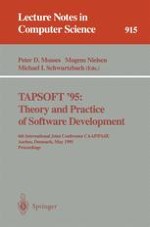1995 | ReviewPaper | Buchkapitel
Rational mechanics and natural mathematics
verfasst von : Vaughan Pratt
Erschienen in: TAPSOFT '95: Theory and Practice of Software Development
Verlag: Springer Berlin Heidelberg
Enthalten in: Professional Book Archive
Aktivieren Sie unsere intelligente Suche, um passende Fachinhalte oder Patente zu finden.
Wählen Sie Textabschnitte aus um mit Künstlicher Intelligenz passenden Patente zu finden. powered by
Markieren Sie Textabschnitte, um KI-gestützt weitere passende Inhalte zu finden. powered by
Chu spaces have found applications in computer science, mathematics, and physics. They enjoy a useful categorical duality analogous to that of lattice theory and projective geometry. As natural mathematics Chu spaces borrow ideas from the natural sciences, particularly physics, while as rational mechanics they cast Hamiltonian mechanics in terms of the interaction of body and mind.This paper addresses the chief stumbling block for Descartes' 17th-century philosophy of mind-body dualism, how can the fundamentally dissimilar mental and physical planes causally interact with each other? We apply Cartesian logic to reject not only divine intervention, preordained synchronization, and the eventual mass retreat to monism, but also an assumption Descartes himself somehow neglected to reject, that causal interaction within these planes is an easier problem than between. We use Chu spaces and residuation to derive all causal interaction, both between and within the two planes, from a uniform and algebraically rich theory of between-plane interaction alone. Lifting the two-valued Boolean logic of binary relations to the complex-valued fuzzy logic of quantum mechanics transforms residuation into a natural generalization of the inner product operation of a Hilbert space and demonstrates that this account of causal interaction is of essentially the same form as the Heisenberg-Schrödinger quantum-mechanical solution to analogous problems of causal interaction in physics.
